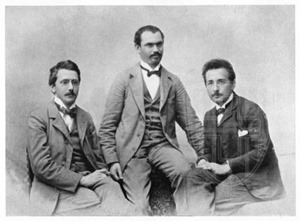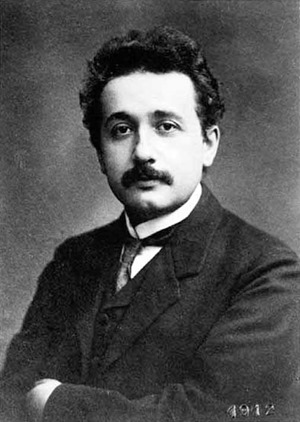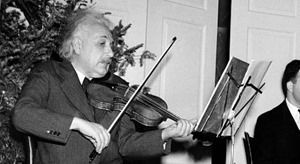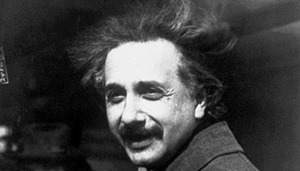Albert Einstein: The Cocky Patent Examiner Who Changed the Face of Science (Pt.2)
- { A misfit wanderer at birth } -
- { A nonconformist “lazy dog” & An advocate for education based on freedom } -
- { A merrily skeptical patent examiner } -
Part 2:
- { Family + Friendship + Science = … } -
1 year after moving to Bern, Einstein got married with his university sweetheart Mileva – a plain, intelligent woman. At the time, they’d had an illegitimate child who died from scarlet fever shortly after the marriage. They had the second child in 1904 as Einstein reached the middle of his twenties.
Mileva, the woman Einstein chose to marry despite his parents’ uproar, played a big role in Einstein’s achievements. What special about Mileva wasn’t her appearance or charm – in fact she was considered “ugly” by his friends and family. What attracted Einstein, not surprisingly, was her brain. She was the only woman in his class, bold enough to dabble in the world of men. They shared an intense passion for science. In the writing of Relativity Theory, Mileva thoroughly edited the paper and did all the math calculations – which Einstein didn’t have the appetite for. Though she did not contribute any original ideas, her importance was undeniable.
Besides Mileva, Einstein – despite his lone ranger air – had a knack at creating intimate relationships with like-minded people. In Bern, he met two friends and with them formed life-long friendship. They jokingly called themselves the “Olympia Academy”, discussed science every week, together read modern physics and sometimes went hiking. This was an integral part of Einstein’s social life in his twenties. His fruitful interactions with people who shared the same passion sparked creativity. The Relativity Theory was so original that it was published without any referral to or citation of external sources, except for Einstein’s recognition of his “Olympia Academy” fellow Besso for igniting the idea.
- { What is Einstein made of ? } -
Let us now look at what Einstein was made of. Below were his substances; they took roots in childhood, flourished in his twenties, and followed him for the rest of his life:
- Simplicity -
in lifestyle
Early on, Einstein developed a repulsion towards excessive accumulation of wealth. He refused to work as an engineer for the family business because he couldn’t conceive the idea of putting money as primary goal. From 1900 to 1911, Einstein labored to keep his family aloft and his passion alive.
At times, he would hope to earn a better salary in order to continue his scientific studies in easier conditions. However, money indeed was never the ladder he chose to climb. In the letter to his girl friend, and later his wife, Mileva, the unemployed fresh graduate Einstein wrote:
No matter what happens, we’ll have the most wonderful life in the world. Pleasant work and being together – and what’s more, we now answer to no one, can stand on our own feet, and enjoy our youth to the utmost. Who could have any better? When we have scraped together enough money, we can buy bicycles and take a bike tour every couple of weeks.
What a pure definition of “the most wonderful life in the world”! This echoes the notion of living minimally to enjoy its lightness and freedom – something I’ve tried to promoted since the beginning of Life Written.
in science
Simplicity also shined in his approach to science. The power of Einstein’s brain did not lie in mental capacity to process large information, but in his ability to intuitively grasp the essentials of a large complex of facts, from that, theorize a law, then imagine how the law worked purely through thought experiment, and derive his conclusions. Einstein, due to a lab accident, had a slight phobia about laboratory experiment. Therefore, he simply imagined how the experiment would happen in his head. At the end of his papers, he would casually suggest other scientists to use lab experiment to validate his laws or equations. Most of the time, Einstein was right.
Albert Einstein did not add. He removed. He did not necessarily collect or create more data. What he did was to seek universal principle.
This might be the reason why his papers were written with utmost simplicity. Sending out on 30 Jun 1905, his paper on Special Relativity Theory, which defied all conventional wisdoms in physics including Newton’s laws, was something a good high school student could comprehend. It wasn’t a matrix of equations that put an average reader in coma. Einstein crafted an enjoyable read – with simple words and vivid thought experiments – to convey a disturbingly new and significant idea.
- A sense of wonder and reverence for life -
Albert Einstein was a beautiful soul. He adored music, especially Mozart, and played the violin. Music wasn’t a distractor, it helped him think. Einstein often retreated to his room, played the violin, and in the midst of music, figured out a solution. During his twenties in Bern, he would go to concert once per week.
He admired the Bohemian, Gypsy’s life and fond of being with nature. Early on and throughout his life, Einstein held dear a deep reverence to the harmony of the universe, and an awe for the mystery of life. He never ceased to look at even the most common details – like gravity, light beams, magnetic fields – with astonishment. His reverence for life created the trait that set him aside from many other impudent genius: humility and empathy for humanity. Simply put, Albert Einstein was a good man.
- Inner security blended with immense curiosity -
Einstein was famous for his casual willingness to challenge authorities. Being a 20-something unemployed, undistinguished graduate, Einstein dared to publically criticize theories of some big science experts in Europe. Later on, in his paper on Special Relativity, the third-class patent examiner, who do not own a doctorate or a professorship or frequent access to a library, blatantly referred to all existing scientific dogma as “superfluous”. This equaled to flipping the scientific community’s dining table during dinner.
Here we must scratch our heads and wonder what fueled his untamable brashness. And here, I think, lies the greatness of Albert Einstein:
Einstein’s rebellion wasn’t born out of arrogance. It was born from a strong sense of inner security and an immense curiosity.
This “Einstein Way” was what set him apart from other young scientists who were intelligent enough to derive the same truth, but lack of intellectual freedom to dismiss all dogma.
He possessed a rare power: the confidence of innocence, like a child whose eyes weren’t clouded by fear but filled with twinkles. He did not want fame. Nor did he try to prove something. He wasn’t on a hunt for gratification to feed his ego.
Einstein simply wanted to understand and to find out the truths. He loved life too much not to.

People like you and me never grow old. We never cease to stand like curious children before the great mystery into which we were born.
 For me, the most interesting thing about Einstein’s 20s was his vigorous pursuit of physics studies, despite a full time job and a family. His story assured me that it is possible to handle the harsh reality while keeping my dreams alive.
For me, the most interesting thing about Einstein’s 20s was his vigorous pursuit of physics studies, despite a full time job and a family. His story assured me that it is possible to handle the harsh reality while keeping my dreams alive.
What about you?
--- Inspired? Curious? Come back to find out about other “Grand 20-Somethings”
--- Einstein: His Life and Universe by the master biographer Walter Isaacson is an incredible read and re-read. I’m grateful for the insights in this book in the process of writing this article.




